人教版七年级下unit12Section A1
人教版七年级下册Unit12 第1课时 Section A(1a-1c)含答案
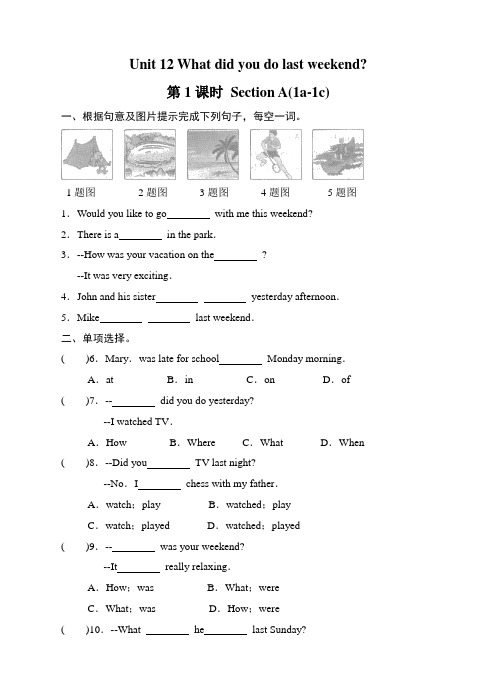
Unit 12 What did you do last weekend?第1课时Section A(1a-1c)一、根据句意及图片提示完成下列句子,每空一词。
1题图2题图3题图4题图5题图1.Would you like to go with me this weekend?2.There is a in the park.3.--How was your vacation on the ?--It was very exciting.4.John and his sister yesterday afternoon.5.Mike last weekend.二、单项选择。
( )6.Mary.was late for school Monday morning.A.at B.in C.on D.of ( )7.-- did you do yesterday?--I watched TV.A.How B.Where C.What D.When ( )8.--Did you TV last night?--No.I chess with my father.A.watch;play B.watched;playC.watch;played D.watched;played( )9.-- was your weekend?--It really relaxing.A.How;was B.What;wereC.What;was D.How;were( )10.--What he last Sunday?--He went to the zoo.A.does;do B.is;doing C.will;do D.did;do 三、按要求完成下列句子。
11.Helen washed her clothes yesterday afternoon.(对画线部分提问)Helen yesterday afternoon?12.Linda visited the museum last weekend.(改为一般疑问句)Linda the museum last weekend?13.托尼刚才在房间做作业。
七年级英语下册(人教版)Unit12第1课时(SectionA1a2c)说课稿
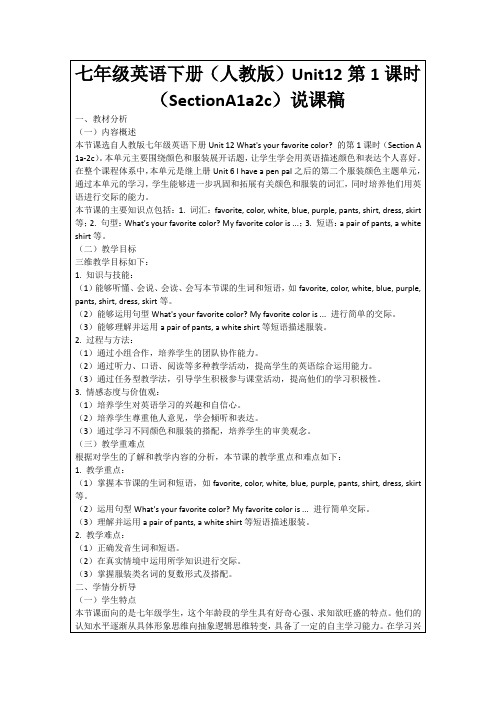
3.不断提高自身教学水平,学习新的教学理念和方法,以适应学生的需求。
(3)掌握服装类名词的复数形式及搭配。
二、学情分析导
(一)学生特点
本节课面向的是七年级学生,这个年龄段的学生具有好奇心强、求知欲旺盛的特点。他们的认知水平逐渐从具体形象思维向抽象逻辑思维转变,具备了一定的自主学习能力。在学习兴趣方面,学生对新鲜事物充满好奇,喜欢通过游戏、互动等形式学习英语。此外,学生在学习习惯上,已初步形成了合作、探究的学习方式,但仍有部分学生依赖性强,需要教师引导和督促。
(二)教学目标
三维教学目标如下:
1.知识与技能:
(1)能够听懂、会说、会读、会写本节课的生词和短语,如favorite, color, white, blue, purple, pants, shirt, dress, skirt等。
(2)能够运用句型What's your favorite color? My favorite color is ...进行简单的交际。
七年级英语下册(人教版)Unit12第1课时(SectionA1a2c)说课稿
一、教材分析
(一)内容概述
本节课选自人教版七年级英语下册Unit 12 What's your favorite color?的第1课时(Section A 1a-2c)。本单元主要围绕颜色和服装展开话题,让学生学会用英语描述颜色和表达个人喜好。在整个课程体系中,本单元是继上册Unit 6 I have a pen pal之后的第二个服装颜色主题单元,通过本单元的学习,学生能够进一步巩固和拓展有关颜色和服装的词汇,同时培养他们用英语进行交际的能力。
(三)பைடு நூலகம்动方式
人教版英语七年级下册Unit12SectionA(1a2c)教学设计
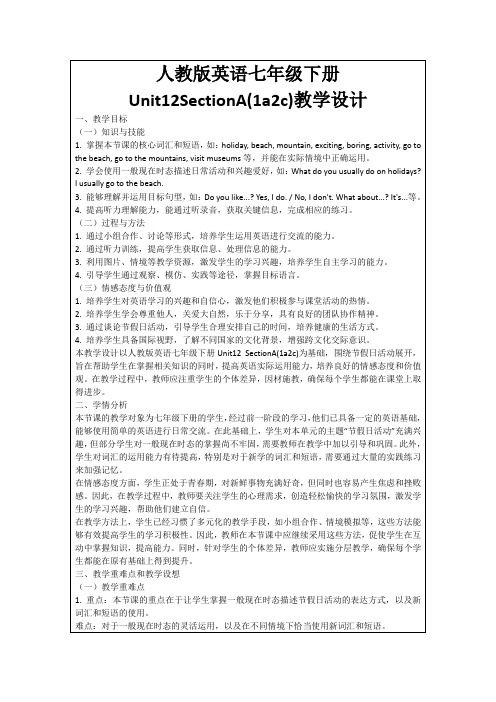
4.引导学生观察图片并回答问题,教师揭示本节课的主题:“Yes, today we are going to learn about holidays and activities.”
(三)学生小组讨论
1.教师将学生分成小组,每组讨论以下问题:“What do you like to do on holidays? Why?”
2.学生在小组内分享自己的观点,使用一般现在时态进行表达,如:“I like to go to the mountains because it's quiet and beautiful.”
3.教师巡回指导,关注学生的讨论过程,及时给予帮助和鼓励。
4.每个小组选取一名代表,向全班汇报讨论成果,其他小组成员认真倾听并给予评价。
5.教师对学生的讨论进行点评,强调重点语法和词汇的运用。
(四)课堂练习
1.教师呈现2a部分的练习,要求学生根据听力材料,完成相应的任务。
2.学生独立完成练习,提高听力理解能力。
b.制作一张关于节假日活动的手抄报,用英文展示所学知识,提高学生的动手能力和审美意识。
作业要求:
1.学生应在课后认真完成作业,注意书写规范,保证作业质量。
2.家长要关注学生的学习情况,协助学生完成口语作业,并及时给予反馈。
3.教师在批改作业时,要关注学生的错误类型,给予针对性的指导和建议。
4.鼓励学生在完成作业的过程中,积极思考、主动探索,提高自主学习能力。
人教版英语七年级下册Unit12SectionA(1a2c)教学设计
人教版初中英语七年级下册Unit12SectionA教材全解

人教版初中英语七年级下册Unit12SectionA教材全解Unit 12 What did you do last weekend?Unit 12 Section A教材全解1.go boating去划船【重点注释】这是“go+doing”结构的短语,类似的还有:go swimming/fishing/shopping/skating/camping去游泳/钓鱼/购物/滑冰/野营。
2.camped by the lake在湖边野营【重点注释】①camp此处作不及物动词,意为“扎营,宿营”,常用短语go camping意为“去野营”,camp out意为“野营;露营”。
例如:We camped near the beach.我们靠近海滩宿营。
Where did you camp last night?昨晚你在哪里宿营了?They often go camping on summer holidays.他们经常在暑假去野营。
I went camping with my friends last Sunday.上星期日我和朋友们去露营了。
The students love camping out on summer holidays.学生们喜欢在暑假中露营。
【拓展记忆】camp还可作名词,意为“野营,营地“,可构成词组:summer camp夏令营,winter camp冬令营。
例句:Let’s go back to the camp.It’s getting dark.我们回营地吧。
天快黑了。
We had a good week at the camp.我们在营地过了愉快的一周。
Did you go to summer camp last year?去年你参加夏令营了吗?②by the lake在湖边,by此处是介词,意为“在……旁边”、“在……近旁”、“在……手边”,此时要注意它与介词near有所不同,即by表示的距离更“近”。
最新人教版七年级下册英语Unit 12 Section A (1a-2d)

释·疑难 tired与tiring的辨析
tired tiring
词性
含义
形容词 疲惫的; 疲劳的
形容词
令人劳累的; 令人疲 劳的
用法
用来描述人的感受, 常置于 系动词后作表语
用来修饰物, 描述事物的特 征
巧·运用
( C )①—You look _____ today.
—Yes. I stayed up late last night to watch a talk show.
释·疑难 stቤተ መጻሕፍቲ ባይዱy的用法
词性
实义 动词
连系动词
含义 停留; 待
保持
用法
(1)表示“待在某处”时, 常用“stay in/at+地点 名词”; (2)表示“和某人待在一起”时后接介词with; (3)stay up意为“熬夜”, 后面可接late或all night之类的词语。
相当于keep, 后常接形容词作表语。
Ⅲ 完成句子 1. 昨晚你在为科学考试学习吗? _D_i_d_ you _st_u_d_y_ _fo_r_ the science exam yesterday evening? 2. 不要熬夜太晚, 那对健康没有好处。 Don’t _s_ta_y_ _u_p_ too late. It’s bad for your health. 3. 昨天他们去公园划船了。 They _w_e_n_t_ _b_o_a_t_in_g_ in the park yesterday.
Ⅱ 用所给词的适当形式填空 1. I saw lots of white _sh_e_e_p_(sheep) on the farm yesterday. 2. He _d_id_n_’_t_w__a_tc_h_(not watch) TV yesterday evening. 3. He put on his coat and _w_e_n_t_(go) out. 4. Many _v_is_i_to_r_s_(visit) would like to visit Hollywood(好莱坞) on their vacation. 5. She usually does her homework at home, but she _d_id_(do) her homework at school yesterday.
人教版七年级英语下册教学课件《Unit 12 Section A Grammar Focus-3c》
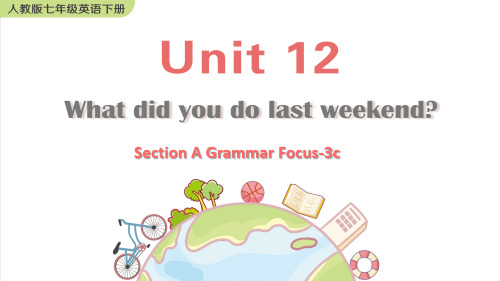
昨天下午他们在哪里? _W__h_e_r_e_ _w_e_r_e_ they yesterday afternoon? 昨天晚上谁在教室里? W__h_o_ w__a_s_ in the classroom last night? 昨天你为什么迟到了? _W__h_y_ _w_e_r_e_ you late yesterday?
He did his homework on Saturday morning.
What did he do last Saturday?
He went boating on Saturday afternoon.
What did he do last weekend?
He played badminton. Who did he play with? He played with his sister.
What did you do last weekend? Who visited her grandma? Where did she go last weekend?
Who did she go with?
I did my homework./ We went boating. Becky did.
1. A: _W__h_a_t__ did you do last weekend? B: I played badminton on Saturday. A: Sounds fun. W ___h_o__ did you play with? B: I played with my father. He’s really good!
3c Think of two things you did last weekend. Draw pictures of them. Your classmates
2019-2020学年人教版英语七年级下册Unit12SectionA(1a~2d)教案

4.学习能力:通过小组合作、讨论等方式,培养学生自主学习、合作探究的能力,提高学习效率。
三、教学难点与重点
1.教学重点
-词汇:本节课的核心词汇包括post office, police station, bank, hotel, restaurant等地点名词,以及down, left, right等方向词。教师需重点讲解和让学生熟练掌握这些词汇,以便在实际场景中运用。
-句型:How do I get to...?和Go down... Turn left...等问路和指路句型是本节课的重点,教师应引导学生通过听力、阅读和口语练习,熟练运用这些句型。
-一般现在时态:通过短文阅读,复习一般现在时态的用法,强调动词第三人称单数形式的正确使用。
2.教学难点
-方向词的运用:学生在描述路线时,容易混淆方向词,如left和right,教师应通过图示、手势等直观教学方法,帮助学生理解并正确使用方向词。
其次,我发现部分学生在方向词的运用上还存在一定的困难。在接下来的教学中,我需要更加关注这一点,通过丰富多样的教学活动,如手势、图示等,帮助学生更好地理解和记忆方向词。
此外,小组讨论环节让我看到了学生们的合作精神和思考能力。他们在讨论中相互启发、共同解决问题,这对于培养他们的团队协作能力具有重要意义。然而,我也注意到部分学生在讨论中过于依赖同伴,独立思考能力有待提高。在未来的教学中,我将注重引导学生独立思考,提高他们的自主学习能力。
2.实验操作:为了加深理解,我们将进行一个简单的角色扮演活动。学生模拟问路和指路的场景,实际运用所学知识。
3.成果展示:每个小组将向全班展示他们的讨论成果和角色扮演的结果。
人教版英语七年级下册:(Unit 12)Section A(1a~2d)【教案】
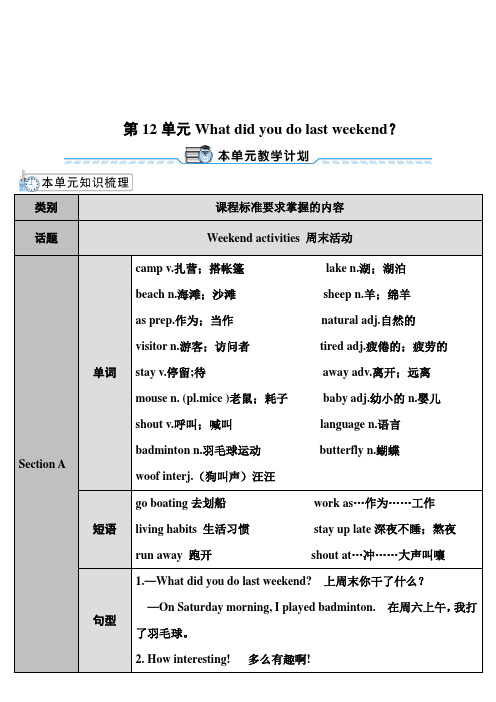
第12单元What did you do last weekend ?类别课程标准要求掌握的内容话题Weekend activities 周末活动Section A 单词camp v.扎营;搭帐篷lake n.湖;湖泊beach n.海滩;沙滩sheep n.羊;绵羊as prep.作为;当作natural adj.自然的visitor n.游客;访问者tired adj.疲倦的;疲劳的stay v.停留;待away adv.离开;远离mouse n. (pl.mice )老鼠;耗子baby adj.幼小的n.婴儿shout v.呼叫;喊叫language n.语言badminton n.羽毛球运动butterfly n.蝴蝶woof interj.(狗叫声)汪汪短语go boating去划船work as…作为……工作living habits 生活习惯stay up late深夜不睡;熬夜run away 跑开shout at…冲……大声叫嚷句型1.—What did you do last weekend? 上周末你干了什么?—On Saturday morning, I played badminton. 在周六上午,我打了羽毛球。
2. How interesting! 多么有趣啊!句型1. I was so tired that I went to sleep early. 我是如此疲劳以至于早早地去睡觉了。
2. We saw a big snake sleeping near the fire. 我们看见一条大蛇正在篝火旁边睡觉。
3. My dad told me later that snakes don’t have ears but can feel things moving. 我的爸爸后来告诉我蛇没有耳朵但能感知东西在移动。
语法一般过去时(二)写作描述周末活动知识目标一般过去时态(Ⅱ)能力目标掌握一般过去时态的各种句式变化;运用过去时态谈论过去发生的事情;能够用日记的形式记录一天的活动并表达感想。
2018-2019学年人教版新目标版英语七年级下册Unit12 Section A 1课件
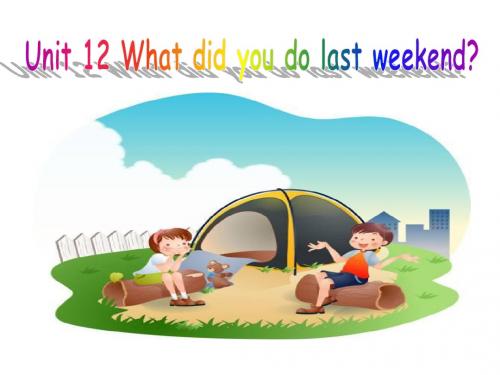
watched TV
listened to music
played soccer
cleaned the room
drew pictures
ate ice cream
read a book (read)
fed the chickens
went shopping
What did they do last weekend?
They visited a history museum.
1a Match
1. 2. 3. 4. 5. 6.
the activities with the pictures [a-f].
a did my homework __ d went to the cinema __ e went boating __ f camped by the lake __ b went to the beach __ c played badminton __
go camping camp by the lake
go to the beach
/’bæ dmɪntən/
play beach volleyball
play badminton
What did he do?
He played badminton.
What did he do?
He went boating.
1.What did Carol do on the weekend? Did she watch TV? She stayed at home and cleaned the house. No, she didn’t. 2.What did Steven do? He worked at the studio. 3.What did Jake do? How was his weekend? He played tennis with a friend and listened to music at his place. It was great.
人教版七年级下Unit 12Section A课件

2. —How was your vacation? —It was pretty good. how 是用来提问状况的, 该句型等同 于What do you think of…….? 例如: ①--How was your weekend? --It was great. ②What did you think of your vacation?
3.
--How was the weather? --It was hot and humid. 此处的How was the weather? 用 于提问天气, 等同于句型 What was the weather like?
2. Fill in the blanks with the words from the box.
Choose a place to have a trip, and make a new conversation with your partner. 参考句子: How is it going? Where did you go? How was your vacation? How was the food/people/ weather?
What did the people think of their vacations?
How were the beaches?
They were beautiful.
Complete your vacations :
last summer I went ____(go) to the was (is) pretty beach . My vacation___ went (go) there by bus and good . I_____ was (is) relaxing . The my bus trip___ was (is) very beautiful . It___ was (is) beach___ sunny, cool and humid .the people were ______(are) friendly and the were (are) delicious .I food_____ _______(enjoy) my vacation very enjoyed much and I hope to go there again .
人教7下Unit12SectionA(1a-2d)教案

评价学生的学习
8
1. T: 2d.
S: :
① ?
② ?
③a ?
: ① a . ② .
③, .
2. .
3. .
1.通过阅读,学生能通过寻找细节,达到掌握对话大意。
2.通过模仿朗读,以及表演对话,达到语言真实运用的目的。
3.有能力的学生可以在对话原文的基础上创编新的对话,并进行表演,进一步培养巩固学生英语学习兴趣,也检查学生是否掌握当堂课要求达到的教学目标。
2.听第一遍完成教材基本要求,听第二遍提高难度,要求学生用本课目标词汇及句型完成回答问题。
3.通过听音模仿,加大语言输入量以及强化语音语调学习。
1.通过听力检查学生是否能听懂目标词汇与基本句型。
2.学生是否能用目标词汇回答问题。
3.学生是否能通过听音模仿朗读课文。
4
T:. .
S: . .
?
, , I .
总结,听后设置任务提升学生语言运用能力
教学评价
1.本课时的目标设计清晰可操作,活动的设计紧扣目标要求并与目标达成一致。
2.听中的活动设计遵循语言规律,由易到难逐层递进,充分体现语言输入到语言输出的完整过程。
3.听后的活动设计体现对文本内容的深度挖掘和文本再构,体现了对学生思维品格的训练与培养。
附:教学活动设计
2.通过听力原文听音模仿,进一步巩固所学的目标语言。
1.学生是否可以听懂目标句型,并完成配对练习。
2.学生是否可以利用目标语言回答教师提问。
7
1. T: 2c. .
:
A: ?
B: .
A: ?
B: .
A: ?
B: a .
2. . .
学生利用所学目标词汇,创编新的对话,巩固拓展学生词汇及语言能力。
人教版七年级下册英语Unit 12 课时1 Section A (1a-2d)
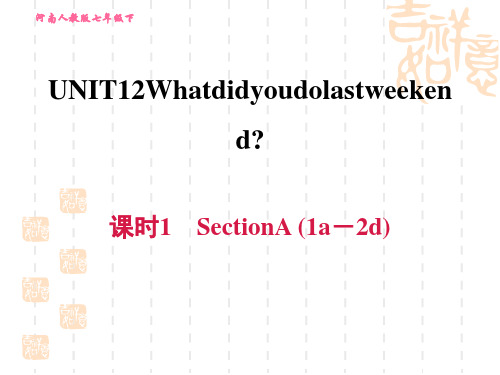
UNIT12Whatdidyoudolastweeken d?
课时1 SectionA (1a-2d)
1 lake
基础巩固练 提示:点击 进入习题 6 camped
2 tired
7 sheep
3 beach
8 visitors
4 As
9 butterflies
5 stay
10 natural
28 Whatdidyoudolastweekend
24 as
29 Doyouoftenclimbthemountains
25 but 30 Wouldyouliketogowithme
一、根据句意及汉语提示完成单词。 1. Mymotherlikestogoforawalkbythesterday, help, mother, your, did, the, clean, you, house _____________________________________________?
Didyouhelpyourmothercleanthehouseyesterday
19 Whendidthechildrengotothefarm Didyouhelpyourmothercleanthehous
20 eyesterday
21 On
能力提升练
26 Itwasgreat/Great/Wonderful
答案呈现
22 of
27 Iplayedbasketball
23 At
答案呈现
wenttothem 11 ovies
基础巩固练
16 Whatdidhedolastweekend
12 livinghabits 17 Igotupearlythismorning
英语人教版七年级下册 Unit12 Section A 1a—2c(共23张PPT)
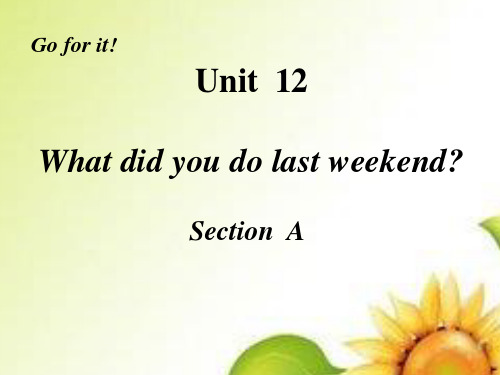
Unit 12
What did you do last weekend?
Section A
last
lake
weekend
busy but happy
camped by the lake
last weekend
on Saturday morning
on Saturday afternoon
on Sunday morning
played badminton went to the beach went boating
on Sunday afternoon
on Sunday night
fed some sheep 单复数同形
campedby the lake
A: What did you do last weekend? 上个周末你做了什么?
A: Who visited her grandma? B: Becky did.
A:What did I do last weekend? B: Did st weekend? A: Yes, I did./ No, I didn’t.
A : Did st weekend? B : Yes, I did./ No, I didn’t.
A : Did st weekend? B : Yes, I did./ No, I didn’t.
A : Did st weekend? B : Yes, I did./ No, I didn’t.
A : Did st weekend? B : Yes, I did./ No, I didn’t.
1
2
3
4
5
6
A: What did she/he/they do last weekend? B: She/He /They...
人教新目标七年级英语下册课件:Unit 12 Section A1
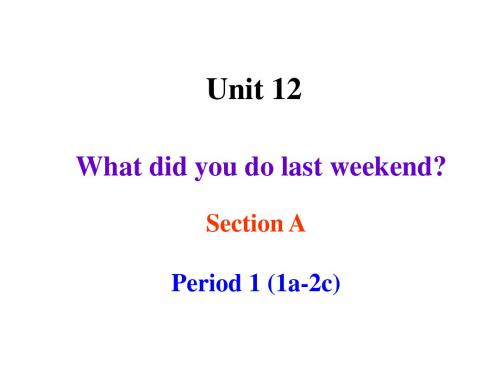
What did you do last weekend?
Section A Period 1 (1a-2c)
What did … do last weekend?
do my homework
did my homework do — did
What did …do last weekend?
1b Listen and write the day, morning, afternoon or night below each picture.
a. Sunday night b. Saturday afternoon c. Saturday morning d. Saturday night e. Sunday afternoon f. Sunday morning
What did … do last weekend?
go to the beach went to the beach
go—went
What did … do last weekend?
play badminton played badminton
play —played
1a Match the activities with the pictures 〔a-f〕.
is — was
2a Listen and underline the words you hear.
1. __B__ I visited my (aunt/grandma). 2. ____ I did my (homework/sports). 3. ____ I studied for the (English/math) test. 4. ____ I went to a (farm/beach). 5. ____ I fed some (sheep/cows).
英语七年级下人教新课标unit12Section A1课件(10张)

Part 1 Section A(课本P67~P68 )
一、根据句意及中文提示完成单词 1. They ___c_a_m_p_e_d__(扎营)in the open air last night. 2. Mike and his sister went boating on the _l_a_k_e__(湖)in the park. 3. Do you want to enjoy the clean air in the __n_a_t_u_r_a_l__(自然的)world? 4. After a long walk, I feel pretty __t_i_r_e_d_(疲 倦的)now. 5. She had to __s_t_a_y_ ( 待 ) at home because it rained yesterday.
二、用所给单词的适当形式填空 1. Of all the _l_a_k_e_s__(lake), I think this one is the best. 2. There are two hundred _s_h_e_e_p__(sheep)on the farm. 3. The __v_i_s_i_t_o_r_(visit)comes from the US. 4. We __c_a_m_p_e_d_(camp)by the river yesterday. 5. My father often __s_t_a_y_s( stay ) up late to work.
(B)1. A. at C. in
(C)2. A. is C. was
(C)3. A. friend C. friendly
- 1、下载文档前请自行甄别文档内容的完整性,平台不提供额外的编辑、内容补充、找答案等附加服务。
- 2、"仅部分预览"的文档,不可在线预览部分如存在完整性等问题,可反馈申请退款(可完整预览的文档不适用该条件!)。
- 3、如文档侵犯您的权益,请联系客服反馈,我们会尽快为您处理(人工客服工作时间:9:00-18:30)。
3. What did she do there?
_____________________________ She told the visitors about the _____________________________ butterflies and their living habits. 4. Why is Paul tired now? Because he stayed up late to watch _____________________________ the soccer game. _____________________________
What did … do last weekend?
go boating went boating go — went
What did … do last weekend?
camp by the lake camped by the lake camp — camped
What did … do last weekend?
What did you do last weekend?
did my homework / sports
What did you do last weekend?
studied for the English / math test
What did you do last weekend?
went to a farm / beach
2. I worked as a guide at the Natural History Museum. 我在自然历史博物馆里做导游的工作。 “work as + 职业” 意为“做某工作”。 例如: 埃里克在那家俱乐部里做音乐老师的工 作。 Eric works as a music teacher in the club.
What did you do on Sunday afternoon?
I camped by the lake.
What about Sunday night?
I did my homework at home.
What did you do last weekend?
visited aunt / grandma
— What did you do, Wu Lin?
— Well. I _____ went ________ boating with my
butterfly house 表示“蝴蝶馆”。
英语中house 的含义与所处的语境密切 相关。例如: a big house 表示“一座大房子”。
但是,my house 不仅表示“我的房子”, 还可表示“我的家”。例如: I hope you all can come over to my house this Sunday for coffee. 我希望这个礼拜天你们全都能够来我家 喝咖啡。
camp
lake
beach
badminton
What did … do last weekend?
do my homework did my homework do — did
What did …do last weekend?
go to the cinema went to the cinema go — went
Sunday afternoon
Saturday morning
Sunday morning
What did he do?
He played badminton.
What did he do?
He went boating.
What did he do?
He went to the cinema.
1. sheep 名词,意为“绵羊”。它是单复 数同形的单词,当它作主语时谓语动词 的单复数形式要根据它在句中的意思来 确定。类似的单词还有deer (鹿), Chinese (中国人)等。例如: Where are your sheep, Ted? Every sheep has a thick woolly coat. 每只羊身上都穿着一件厚的羊毛外套。
3. How interesting! 多么有趣啊! 这是一个感叹句,句子结构为: How + 形容词或副词 + (主语 + 谓 语)!
那本书太有趣了!
How interesting the book is!
4. I stayed up late to watch the
soccer game.我熬夜看足球赛
stay up 意为“熬夜;深夜不眠” 。 不要熬夜,这对你的健康不好。 Don’t stay up late. It’s bad for your
health.
咱们别睡觉,迎接新年的到来吧。
Let’s stay up to see the New Year.
5. They have a butterfly house with over 200 kinds of butterflies! 它们(指博物馆)有一个有200多种蝴 蝶的蝴蝶馆!
What did they do?
They went to the beach.
What did they do?
They went fishing.
What did he do last weekend?
He did his homework.
What did they do last weekend?
What did you do on Saturday afternoon?
I went to the beon Saturday night?
I went to a movie.
What did you do on Sunday morning?
I went boating with my friends.
He studied for his English test.
Where did Jack go last weekend?
He went to the farm.
What did he do there?
He fed some cows there.
sheep
butterfly
visitor
They visited a history museum.
1c
Role-play. Student A is Lucy. Student B asks Lucy about her weekend.
What did you do last weekend, Lucy?
Well, on Saturday morning, I played badminton.
Listen again. Write C for Carol, J 2b for Jack or B for Becky next to the statements in 2a.
1. ___ B I visited my grandma. 2. ___ B I did my homework. 3. ___ C I studied for the English test. 4. ___ J I went to a farm. 5. ___ J I fed some cows.
tired
stay up
2d Role-play the conversation.
Paul: Hi, Lisa. How was your weekend? Lisa: Great. Thanks. Paul: What did you do? Lisa: I worked as a guide at the Natural History Museum.
last weekend He is at school this week. He was at home last week. is — was
Listen and underline 2a the words you hear. 1. I visited my (aunt / ________ grandma). _________ / sports). 2. I did my (homework 3. I studied for the (English _______ / math) test. 4. I went to a (farm _____/ beach). 5. I fed some (sheep / _____ cows).
Student A asks questions with who, 2c what or where and Student B answers. Then change roles.
Who stayed at home last weekend?
Carol. I think.
What did he do?
go to the beach went to the beach
go—went
What did … do last weekend?
play badminton played badminton play —played
Match the activities with the 1a pictures [a-f].
1. did my homework __ a 2. went to the cinema __ d 3. went boating __ e 4. camped by the lake __ f 5. went to the beach __ b 6. played badminton __ c
What did you do last weekend, Li Lei?
